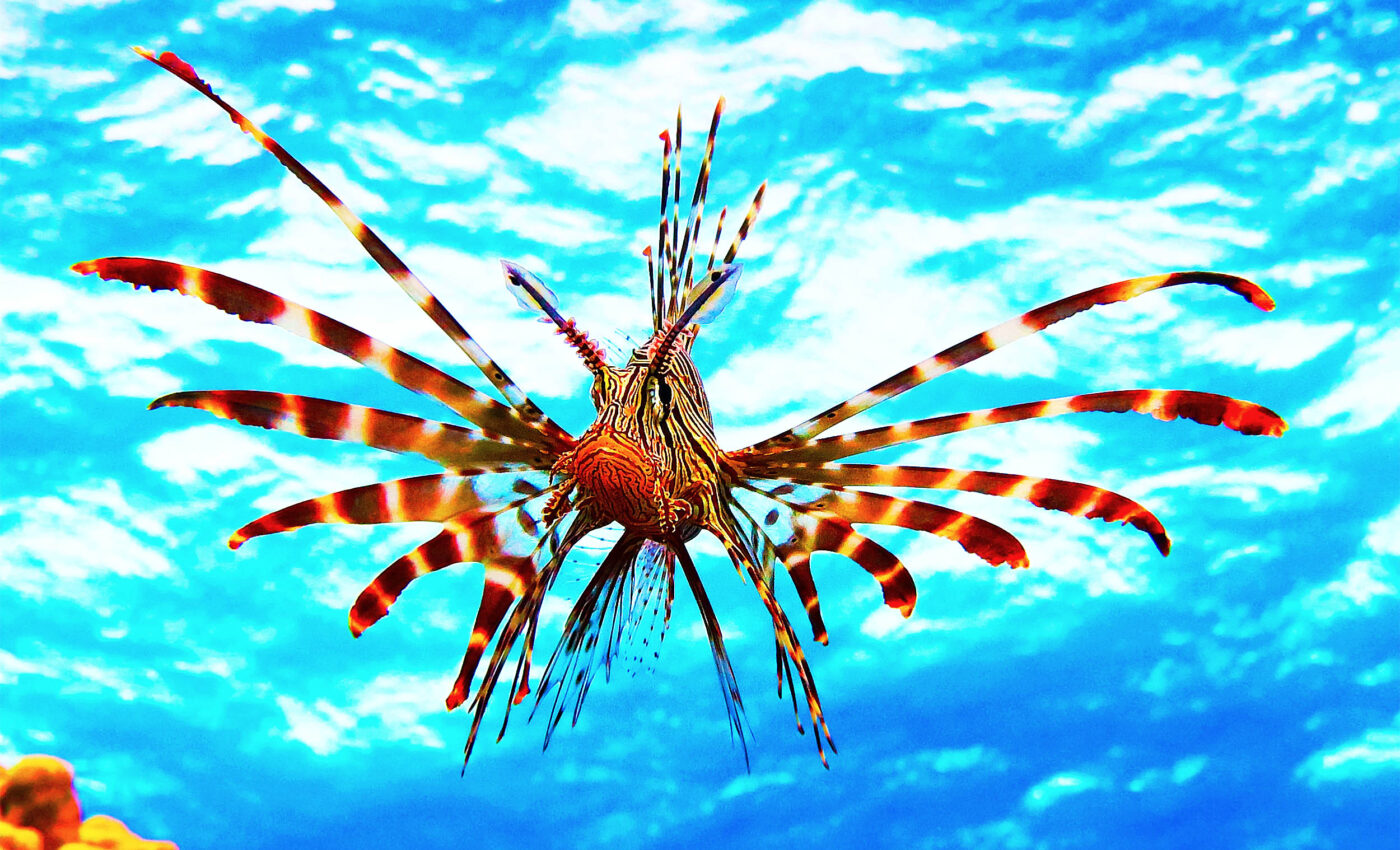
Invasive lionfish continue conquering global marine ecosystems
The Mediterranean Sea, the largest enclosed sea on Earth, is a unique ecosystem renowned for its rich biodiversity. Home to over 11,000 animal species, some of which are endemic, this basin is now facing a significant challenge: the invasion of lionfish.
A comprehensive study conducted by researchers from Wageningen University and Research, the Netherlands, has shed light on the rapid spread of lionfish in the Mediterranean and the potential ecological impacts of this invasive species.
Venomous spines and unconventional beauty
Lionfish possess a striking appearance that sets them apart from other marine fish species. Their body bears a series of distinctive vertical stripes, alternating between dark brown or maroon and white. These stripes act as a warning coloration, signaling to potential predators that lionfish are venomous.
Lionfish have a complex system of venomous spines along their dorsal, pelvic, and anal fins. Their spines contain venom glands that can deliver a painful and potentially dangerous sting to humans and other predators.
The fins of lionfish are large and elongated, giving them a majestic and flowing appearance as they swim through the water. Their head features a series of elaborate, antennae-like projections called cirri, which add to their unique and striking appearance.
Lionfish can grow up to 18 inches (45 cm) in length and weigh up to 2.6 pounds (1.2 kg), making them a substantial presence in the ecosystems they inhabit.
Ravenous lionfish appetite quickly destroys ecosystems
Lionfish are opportunistic and voracious predators that consume a wide variety of prey. Their diet primarily consists of small fish, crustaceans, and mollusks.
They use their large, fan-like pectoral fins to corral and trap their prey before swiftly engulfing them with their expandable stomachs. They’re also known to consume prey up to half their own body size, allowing them to take advantage of a broad range of food sources.
Lionfish have a high metabolism and can consume substantial amounts of prey in a single feeding session. Studies have shown that lionfish can reduce the abundance of native fish populations by up to 80% in heavily invaded areas.
Their indiscriminate appetite and ability to adapt to various prey species make them a significant threat to the biodiversity of the ecosystems they invade.
Seas under siege as lionfish spread around the world
The new study from Wageningen University and Research, published in the open-access journal NeoBiota, reveals that the lionfish species Pterois miles has significantly expanded its territory in the Mediterranean since the invasion began around a decade ago.
Lead author Davide Bottacini is very impressed by the adaptability of these predators. Expressing his astonishment, he explained, “After years studying these predators, I find it amazing how they can easily adjust to so many different environments and be successful in areas that are so different from the ones where they evolve.”
Originally from the Indo-Pacific region, lionfish species Pterois miles and Pterois volitans are considered the most successful invasive fishes in marine ecosystems. They have established a presence in the eastern Mediterranean, with observations now extending to colder waters previously thought to be unsuitable for the species.
Lionfish show remarkable resilience in new ecosystems
Lionfish exert a significant ecological impact on the ecosystems they invade through their predatory behavior. As generalist predators, they voraciously consume a wide variety of native fish species, including those of high conservation value and endemic to the region.
Bottacini notes, “It is always impressive to see how such a flamboyant and–to us–conspicuous predator can approach its prey without being noticed.” Native prey species, unaccustomed to lionfish, usually do not flee from this new predator.
Lionfish’s indiscriminate appetite can drastically alter local fish communities and threaten biodiversity in invaded areas. Their efficient hunting tactics, combined with the naivety of native prey species unfamiliar with this new predator, allow lionfish to catch their prey with ease.
The presence of lionfish can lead to a decline in the abundance and diversity of native fish populations, potentially disrupting the delicate balance of the ecosystem.
The impact of lionfish extends beyond their immediate prey, as they may compete with other predators for food resources and alter the structure of the food web.
From the Red Sea to the Mediterranean
Genetic studies have revealed that the lionfish found in the Mediterranean originate from the Red Sea and likely entered through the Suez Canal.
This finding underscores the importance of monitoring and regulating the movement of species through artificial waterways to prevent the introduction of invasive species into vulnerable ecosystems.
The study identifies gaps in our understanding of the lionfish’s interactions with Mediterranean ecosystems and proposes future research directions to address these challenges.
Such information is vital for biodiversity conservation and will have practical implications for policymakers aiming to devise effective mitigation plans.
The researchers also highlight the crucial role of citizen science initiatives in tracking and reporting lionfish sightings.
Community involvement provides valuable data that supports ongoing research efforts and is essential for enhancing our understanding of the invasion dynamics and devising effective control measures.
Lionfish and the future of Earth’s marine ecosystems
In summary, the lionfish invasion in the Mediterranean Sea demands immediate attention and action. As these adaptable predators continue to expand their territory and threaten the region’s unique biodiversity, we must prioritize research efforts to better understand their ecological impact and develop effective mitigation strategies.
By fostering collaboration among scientists, policymakers, and local communities, we can work towards controlling the spread of lionfish and protecting the Mediterranean’s delicate ecosystems.
The future of this remarkable sea and its countless species depends on our collective commitment to conservation and our willingness to confront the challenges posed by invasive species head-on.
The full study was published in the journal NeoBiota.
—–
Like what you read? Subscribe to our newsletter for engaging articles, exclusive content, and the latest updates.
Check us out on EarthSnap, a free app brought to you by Eric Ralls and Earth.com.
—–













